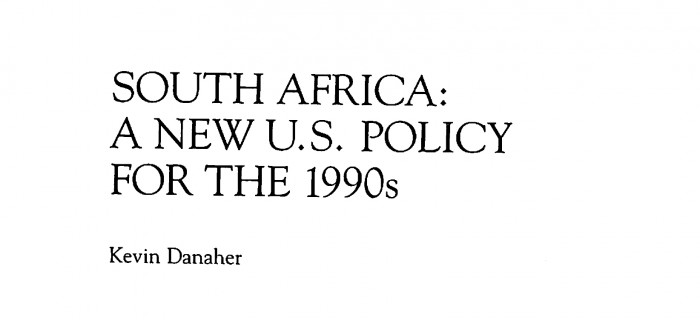South Africa: A new US policy for the 1990s
By Kevin Danaher, April 1988, Development Report No. 3
Summary
It is proper to wonder how South Africa can so confidently defy the civilized world. The conclusion is inescapable that it is less sure of its own power, but more sure that great nations will not sacrifice trade and profit to oppose them effectively. The shame of our nation is that it is objectively an ally of this monstrous Government in its grim war with its own black people. – Rev. Martin Luther King, Jr.
There have been many changes in the world since Martin Luther King, Jr., made that statement in 1965. Unfortunately, U.S. policy toward South Africa has changed surprisingly little. Despite the sanctions legislation enacted in late 1986—against the will of President Reagan—the United States remains the single most important protector of South Africa’s apartheid regime. (While by 1988 Japan had become South Africa’s top trading partner, the United States’ position as the largest economy and the leading military and political power of the capitalist world gives it the most influence in the international struggle over apartheid.)
This report explains why this is so. By analyzing the historical relationship between the two countries, we lay a basis for proposing a new U.S. policy that would simultaneously strengthen the struggle against apartheid and advance U.S. interests throughout southern Africa. Understanding the potential for these two goals to be complementary—which they have not been in the past—requires an examination of the interest groups that have traditionally shaped U.S. policy toward South Africa.
The report gives a brief historical overview of U.S. policy. As African states achieved independence and black Americans gained political rights, U.S. policymakers were forced into a “straddle” regarding apartheid: denouncing white minority rule while doing little to interfere with the support given to apartheid by major U.S. corporations and security agencies of the U.S. government.
This report provides a theoretical framework for understanding why U.S. policy has been so contradictory—denouncing apartheid while blocking actions aimed at weakening apartheid.
Our analysis then focuses on the Reagan administration’s policy of “constructive engagement, explaining how the policy subordinated African realities to a dogmatic emphasis on East-West competition. By comparing the Reagan team’s strategy, as laid bare in secret documents, with the changing realities of southern Africa, we can comprehend why the policy was not only spurned internationally but was rejected by the American people as well. The report also provides a theoretical framework for understanding why U.S. policy has been so contradictory-denouncing apartheid while blocking actions aimed at weakening apartheid. It exposes the weakness of relying on the nation-state as a key conceptual category and develops analytical tools for creating a new definition of the “national interest.
Stay in the loop with Food First!
Get our independent analysis, research, and other publications you care about to your inbox for free!
Sign up today!We conclude with a detailed proposal for a new U.S. policy. By examining the many measures—economic, political, military—the United States could use to weaken apartheid and build U.S. ties to majority forces in South Africa and surrounding countries, the report constructs a viable alternative policy. But implementing these policy changes will require an antiapartheid movement capable of healing its many divisions and expanding its reach by convincing large numbers of Americans that they would benefit from democracy and development in South Africa. This must be part of a larger political movement challenging the U.S. elites who implement foreign policies that undermine our true national interests.


 Help Food First to continue growing an informed, transformative, and flourishing food movement.
Help Food First to continue growing an informed, transformative, and flourishing food movement.




